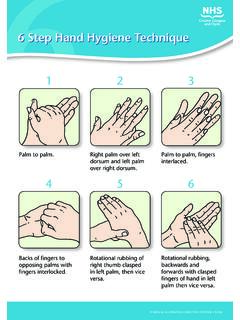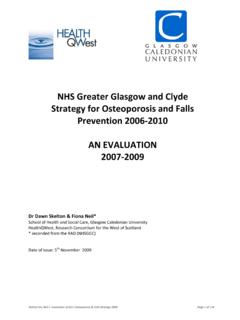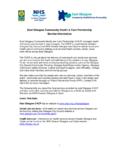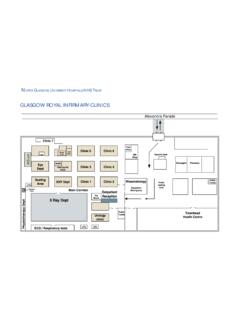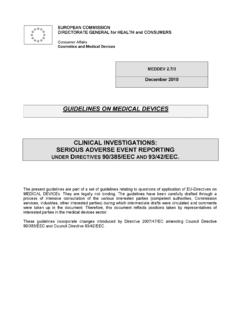Transcription of Psychological Needs following Stroke - NHSGGC
1 Psychological Needs following Stroke Dr. Joanne Robertson Chartered Principal Clinical Psychologist Clinical Psychology Stroke Service - Clyde 10th March 2010. Overview The Psychological consequences of Stroke Why are clinical psychologists included in Stroke rehab teams and what are their roles? Assessment and Formulation of post - Stroke emotional difficulties Psychological therapy for post Stroke difficulties Neuropsychological assessment and cognitive rehabilitation How to refer to the Stroke Psychology service The Psychological Consequences of Stroke Adjustment Anxiety, anger, sadness = normal healthy' distress (grief reaction). De Ridder et al (2008). Promote adjustment by: - Acknowledging (negative).
2 Emotions - Self management, to increase control - Remain as active as possible - Find positive meaning The Psychological Consequences of Stroke Adjustment cont . We typically tell patients it may take 6-24 months to adjust emotionally to their Stroke Advising patients of this can be beneficial However Some patients may struggle with adjustment to the many changes following Stroke , leading to clinically significant'. emotional or behavioural problems (DCP, 2008). Depression & Anxiety Around 1/3 of patients are depressed post Stroke (Hackett et al, 2005). Mood disorders have been found to impede patient progress in rehabilitation ( Paolucci et al, 1999). Around 1/4 of Stroke patients may also suffer moderate to The Psychological Consequences of Stroke Cognitive Impairment Approx 35% of patients are cognitively impaired post Stroke (Tatemichi et al, 1994).
3 Impairments may affect attention, memory, language, movement, perception, disinhibition, emotionalism, executive functioning, insight etc. Cognitive impairment can impact on functional recovery (Robertson et al, 1997, Patel et al, 2003) and create additional challenges for staff and families. Family Functioning Families must adjust too adoption of caring role, changing relationships, sexual problems, financial pressures etc. These changes can cause significant stress. The Psychological Consequences of Stroke Sleep Problems Around 20% of patients may suffer insomnia due to their Stroke (Leppavuori et al, 2000). Insomnia is a common comorbid symptom of depression or anxiety Maintaining factors may be neurological or Psychological behavioural, cognitive.
4 Why are clinical psychologists included in Stroke rehab teams? National Clinical Guideline for Stroke (2008) & SIGN 64. Guidelines recommend that Stroke teams should include a clinical psychologist. Clinical psychologists have skills complementary to other members of the rehab team. Clinical psychologists are specially trained in assessment, formulation and treatment of Psychological difficulties, including specialist neuropsychological assessment and management of cognitive impairment. Where do we work? Hospital Hospital In-patients Out-Patients Community Stroke Teams Roles of Clinical Psychologists in Stroke Teams Direct Patient Contact - Assessment, formulation and management of Psychological disorders post - Stroke including depression, anxiety, self-esteem issues and adjustment difficulties - Assessment, formulation.
5 Management and cognitive rehabilitation of post - Stroke impairment - Assessment and management of behavioural problems post - Stroke Indirect Patient Contact - Assessment of carer strain on patients post - Stroke - Working with carers as co-therapist - Consultation and advice to MDT / external care providers Teaching/training & research Assessment and Formulation of post - Stroke Psychological Difficulties Assessment May include one-to-one interview(s), standardised questionnaires, discussions with carers and MDT staff, review of medical notes and possible observation of functioning. As post Stroke impairment varies markedly from person to person, a careful, individualised assessment is required. Formulation Hypothesis based approach.
6 Possible causes and maintaining influences are put forward. This hypothesis guides choice of intervention strategies. Patient response is evaluated and formulation is re-visited and revised if necessary. Scientist-practitioner' model Assessment of post Stroke Psychological functioning Family/social Pre -morbid support Brain pathology factors Stroke , head injury, etc coping style Cognitive Affect Physical Impairment Depression Hemiplegia Memory Anxiety Sensory loss Perception Anger Dysarthria Language Confidence Pain Attention Motivation Executive Insight Loss Functional consequences Work ADL. Leisure Driving Example of formulation framework: The 4 P's Predisposing Previous psychiatric history, personality ( pessimistic).
7 Precipitating Stroke , other Life events, health problems Perpetuating Hopeless, angry, negative thoughts Sense of inadequacy . Inactivity, social withdrawal Dysfunctional beliefs about Stroke Poor sleep Protective Family, relationship, other social networks Psychological Therapy for Mood Disorders after Stroke Widespread agreement that early recognition and active management of post - Stroke depression is a necessary part of rehabilitation SIGN 64. Growing evidence base in Stroke psychology. Psychological Therapy for Mood Disorders after Stroke Kneebone and Dunmore (2000). Noted lack of Stroke specific efficacy studies but highlighted effectiveness of Cognitive Behaviour Therapy (CBT) in treating depression in: general adult population older adult population (with appropriate modifications).
8 Others with neurological conditions. CBT also found to be an effective intervention for patients with other comorbid mental health and physical health problems cancer, pain, heart disease ( Moorey et al, 1994). Psychological Therapy for Mood Disorders after Stroke CBT is: Collaborative based on shared formulation of problems Goal driven Problem focused what strategies can be put in place to alter maintaining factors? Relatively brief Behavioural components anxiety management, graded exposure, behavioural activation etc. Cognitive components normalisation, challenging negative thoughts, cognitive restructuring etc. Psychological Therapy for Mood Disorders after Stroke Therapy often seeks to improve patients' understanding of the relationships between thoughts, emotions, physical symptoms and behaviour Neuropsychological Assessment and Cognitive Rehabilitation Seeks to measure the extent and nature of cognitive deficits using standardised, psychometrically valid instruments and can monitor change in cognitive functioning.
9 Can help to identify the types of difficulties an individual will encounter in day-to-day life and in rehab. - Process includes: Interview with client and carer, informed consent, completion of cognitive screen ( ACE-R), tailored neuropsych assessment examining areas of cognitive deficit in depth, feedback to client, family and team where appropriate. Neuropsychological Assessment and Cognitive Rehabilitation Cognitive Rehabilitation Restoration of lost function vs. compensatory rehabilitation. Overall aim is to improve functioning and patient quality of life. Evidence for effectiveness of cognitive rehabilitation specifically in Stroke is limited. Recent systematic reviews of cognitive rehab in broader context of Acquired Brain Injury (including Stroke and TBI) indicate further research required.
10 Case Example . 63 year old man Recently retired, previously active, treasurer of local bowling club Stroke in Morrison's caf in Easterhouse Right sided weakness Poor memory to new verbal information and slowed speed of processing Word finding problems / intact comprehension Low mood and motivation (HADS Depression 16). Highly anxious in social situations (HADS Anxiety 13). Highly irritable with wife slapped on 2 occasions Case Example Cntd Formulation - Anxiety associated with fear of repeat Stroke and belief that others would think him stupid because of his poor memory and speech - High level of irritability directed at wife because she tended to speak quickly and interrupt and speak for him. - Low mood associated with loss of role, hobbies and poor memory - Poor memory for conversation contributed to social anxiety - Wife reporting difficulty coping generally and with husband in house all day - Not complying with physio exercise programme due to low mood Case Example - Goals 1.


